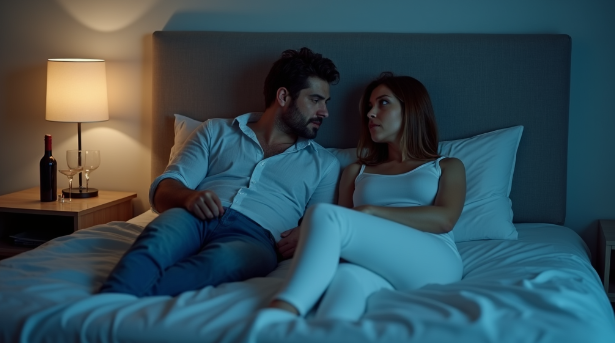Decreased libido, or a reduced interest in sexual activity, is a common issue that can affect people of all ages and backgrounds. Often, it arises due to a combination of physical, emotional, and psychological factors, such as hormonal changes, stress, or relationship dynamics.
While occasional dips in libido are natural, persistent low desire can impact self-esteem and strain relationships. As we look at potential causes and explore solutions, understanding the factors behind decreased libido can help us take steps toward improving intimacy and overall well-being.
Table of Contents
Key takeaways
- Decreased libido is a common issue affecting both men and women
- Hormonal imbalances, stress, and medical conditions can contribute to low sex drive
- Lifestyle changes, therapy, and hormone optimization may help improve libido
- Seeking professional help is crucial for proper diagnosis and treatment
- Open communication with partners is essential for addressing intimacy concerns
Decreased libido, or low sex drive, is a common concern that affects many individuals regardless of age or gender. This article will provide an in-depth look at the causes, symptoms, and potential solutions for those experiencing a decline in sexual desire.
The Basics of Libido

Libido refers to a person’s overall sexual desire or interest in sexual activity. It’s a complex aspect of human sexuality influenced by various biological, psychological, and social factors. Understanding the fundamentals of libido is crucial for addressing any concerns related to decreased sexual desire.
What determines libido?
Several factors contribute to a person’s sex drive:
- Hormones: Testosterone and estrogen play significant roles in regulating sexual desire for both men and women.
- Brain chemistry: Neurotransmitters like dopamine and serotonin affect mood and arousal.
- Physical health: Certain medical conditions and medications can impact libido.
- Mental health: Stress, anxiety, and depression can all lower sexual interest.
- Relationship dynamics: The quality of a person’s intimate relationships can influence desire.
Understanding these factors can help individuals identify potential causes of decreased libido and seek appropriate solutions.
Recognizing the Signs of Decreased Libido

Identifying a decrease in sexual desire is the first step toward addressing the issue. While everyone’s “normal” level of libido varies, certain signs may indicate a significant decline in sex drive.
Common indicators of low libido
- Lack of interest in initiating sexual activity
- Difficulty becoming aroused or maintaining arousal
- Decreased frequency of sexual thoughts or fantasies
- Feeling disconnected from one’s partner during intimate moments
- Avoiding situations that might lead to sexual encounters
It’s important to note that occasional fluctuations in sexual desire are normal. However, if these signs persist over an extended period and cause distress, it may be time to seek professional advice.
The Impact of hormones on libido

Hormones play a crucial role in regulating sexual desire. Understanding how hormonal imbalances can affect libido is essential for addressing decreased sexual interest.
Testosterone and libido
Testosterone is often associated with male sexuality, but it’s important for both men and women. This hormone influences:
- Sexual desire
- Arousal
- Orgasm intensity
Low testosterone levels can lead to decreased libido in both sexes. For men, this may also result in erectile dysfunction.
Estrogen and progesterone
In women, estrogen and progesterone fluctuations throughout the menstrual cycle can affect libido. Imbalances in these hormones, particularly during menopause, can contribute to decreased sexual desire.
Psychological Factors Affecting Libido
Mental health and emotional well-being significantly impact sexual desire. Addressing psychological factors is often crucial in treating decreased libido.
Stress and anxiety
Chronic stress and anxiety can lower libido by:
- Increasing cortisol levels, which can suppress sex hormones
- Causing fatigue and decreased energy
- Distracting from sexual thoughts and desires
Managing stress through relaxation techniques, exercise, and therapy can help improve libido.
Depression and low self-esteem
Depression often leads to a loss of interest in previously enjoyable activities, including sex. Low self-esteem can also contribute to decreased libido by affecting body image and confidence in intimate situations.
Physical Health and Libido
Various medical conditions and lifestyle factors can impact sexual desire. Understanding these physical influences is crucial for addressing decreased libido.
Medical conditions affecting libido
Several health issues can contribute to low sex drive:
- Cardiovascular disease
- Diabetes
- Thyroid disorders
- Chronic pain conditions
Treating underlying medical conditions may help improve libido.
Medications and libido
Certain medications, particularly antidepressants and blood pressure medications, can negatively affect libido. Discussing potential side effects with a healthcare provider is essential for finding alternative treatments if necessary.
Lifestyle Factors Impacting Sexual Desire
Daily habits and choices can significantly influence libido. Addressing these factors can often lead to improvements in sexual desire.
Diet and exercise
A balanced diet and regular physical activity can positively impact libido by:
- Improving overall health and energy levels
- Boosting self-esteem and body image
- Increasing blood flow and hormone production
Incorporating nutrient-rich foods and regular exercise into one’s routine may help enhance sexual desire.
Sleep and libido
Adequate sleep is crucial for maintaining a healthy sex drive. Poor sleep can lead to:
- Hormonal imbalances
- Increased stress levels
- Decreased energy and mood
Prioritizing good sleep hygiene can contribute to improved libido.
Relationship Dynamics and Sexual Desire
The quality of intimate relationships plays a significant role in maintaining sexual interest. Addressing relationship issues is often key to improving libido.
Communication and intimacy
Open and honest communication about sexual desires, concerns, and expectations is essential for maintaining a healthy sex life. Fostering emotional intimacy can also contribute to increased sexual desire.
Addressing relationship conflicts
Unresolved conflicts and resentment can negatively impact libido. Seeking couples therapy or working together to resolve issues can help improve overall relationship satisfaction and sexual desire.
Hormone Optimization for Libido Improvement
For some individuals, hormone optimization therapy may be an effective solution for addressing decreased libido.
Benefits of hormone optimization
Hormone optimization can help:
- Balance testosterone and estrogen levels
- Improve energy and mood
- Enhance overall sexual function
It’s important to consult with a healthcare professional specializing in hormone therapy to determine if this approach is appropriate.
Potential risks and considerations
While hormone optimization can be beneficial, it’s not without risks. Potential side effects and long-term implications should be carefully considered and discussed with a healthcare provider.
Natural Remedies for Boosting Libido
Many individuals prefer to try natural approaches to improving libido before considering medical interventions.
Herbal supplements
Some herbs have been traditionally used to enhance sexual desire:
- Maca root
- Ginseng
- Tribulus Terrestris
However, it’s important to consult with a healthcare provider before taking any supplements, as they may interact with medications or have side effects.
Lifestyle modifications
Simple changes in daily habits can often lead to improvements in libido:
- Reducing alcohol consumption
- Quitting smoking
- Practicing mindfulness and stress reduction techniques
These modifications can contribute to overall health and well-being, potentially enhancing sexual desire.
Seeking Professional Help for Decreased Libido
When self-help measures aren’t sufficient, seeking professional assistance is crucial for addressing persistent issues with low sex drive.
When to consult a healthcare provider
Consider seeking medical advice if:
- Decreased libido persists for an extended period
- Low sex drive causes significant distress or relationship problems
- There are concerns about underlying medical conditions
A healthcare provider can help determine the root cause and recommend appropriate treatments.
Types of professionals to consult
Depending on the underlying causes, various specialists may be helpful:
- Primary care physicians
- Endocrinologists
- Sex therapists or counselors
- Relationship therapists
Working with the right professional can provide targeted solutions for improving libido.
The Importance of Self-care in Maintaining Libido
Prioritizing self-care is essential for maintaining a healthy sex drive and overall well-being.
Mindfulness and stress reduction
Practicing mindfulness and stress reduction techniques can help:
- Reduce anxiety and tension
- Improve body awareness
- Enhance overall sexual satisfaction
Incorporating these practices into daily life can contribute to a more fulfilling sex life.
Nurturing self-esteem and body image
Developing a positive self-image and cultivating self-esteem can significantly impact libido. Engaging in activities that promote self-confidence and body acceptance can lead to improved sexual desire and satisfaction.
Conclusion
Decreased libido is a complex issue with various potential causes and solutions. By understanding the factors that influence sexual desire and taking proactive steps to address concerns, individuals can work towards improving their overall sexual health and satisfaction. Remember that seeking professional help is often crucial for effectively addressing persistent issues with low sex drive.
Struggling with decreased libido? You’re not alone, and at Revv Health, we’re here to help. Our experienced professionals understand how a reduced sex drive can impact your quality of life, relationships, and overall well-being. Let us guide you in exploring effective, personalized solutions that can restore balance and reignite your passion. Take the first step toward revitalizing your health and happiness—schedule a consultation with us today and start feeling like yourself again.


